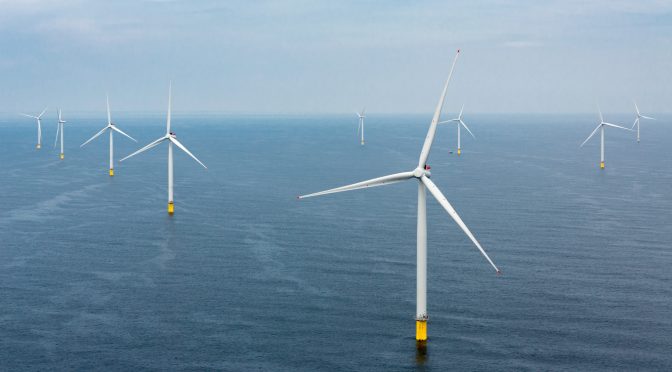New York Governor Andrew Cuomo today announced results of the largest procurement of offshore wind power in U.S. history. Two projects, Empire Wind (Opens in a new window) and Sunrise Wind(Opens in a new window), were named as winners of the state’s first call for offshore wind project proposals. Once completed, the 816 megawatt (MW) Empire Wind project and the 880 MW Sunrise Wind project will be capable of supplying enough electricity to power more than a million homes and are expected to create over 1,600 jobs.
“Governor Cuomo’s vision to power the Empire State with clean, American-made offshore wind power will benefit all New Yorkers,” said Laura Smith Morton, Senior Director, Policy and Regulatory Affairs, Offshore, AWEA. “Large-scale wind projects, like those selected today, equal large-scale job creation and infrastructure investment in New York City and the state’s coastal communities.”
New York’s offshore wind solicitation, opened late last year, called for 800 MW or more to be developed as a first step toward meeting the state’s nation-leading target to build 9,000 MW of offshore wind energy by 2035. The projects selected today are expected to begin offshore construction in late 2022 and be completed by 2024. Before the projects can begin construction, they must pass a series of rigorous federal and state permitting requirements that ensure environmental and economic impacts are considered.
To help make New York a hub for offshore wind, Governor Cuomo also announced new investments totaling $287 million to construct manufacturing, service, and port facilities in New York as well as $20 million dollars for a new wind workforce training program housed in the State University of New York system.
Promoting investment in offshore wind will strengthen and diversify American energy production. Offshore wind offers unique benefits for a state like New York, with a large coastal population center and bold policies to reduce greenhouse gas emissions. Steady offshore wind is a reliable source of power and the largest-scale option for renewable energy that can be built close to America’s coastal cities, like New York City.
While the state is emerging as a central leader in the deployment of new clean energy, New York City could miss a major opportunity to be part of that movement. Mayor DeBlasio is reported to be seeking to power the city with imported Canadian hydropower rather than U.S. offshore wind energy that would drive economic development and job creation.
“The city’s enormous potential for clean energy production lies untapped, just off New York’s shores. As the city seeks to meet its climate change goals—we urge Mayor De Blasio to buy American and put New Yorkers to work building and operating offshore wind farms rather than importing hydropower from outside of the country,” said Andrew Gohn, Director, Eastern Region State Affairs, AWEA.
Offshore wind is still a young industry in the U.S., but that’s rapidly changing. The 30 MW Block Island Wind Farm, America’s first offshore wind farm, came online in 2016 and the second U.S. offshore project, a 12 MW Dominion Energy wind farm, recently began construction off Virginia. In total, there are currently more than 25,740 MW in various stages of development off the East Coast and in the Great Lakes, with additional potential off the West Coast.
Many of the offshore wind projects currently under development, including New York’s, have many times the electricity generating capacity of the Block Island Wind Farm. Building offshore wind at scale will help drive down costs, create tens of thousands of new U.S. jobs, and drive billions of dollars in private investment. According to a study by the New York-based Workforce Development Institute, building an offshore wind farm requires a diverse technical workforce spanning an estimated 74 occupations including electricians, welders, ironworkers, pipefitters, pile drivers, engineers, scientists, and vessel operators. Another study by the Special Initiative on Offshore Wind found building 18.6 gigawatts of offshore wind by 2030 will create a nearly $70 billion opportunity of U.S. supply chain businesses.


